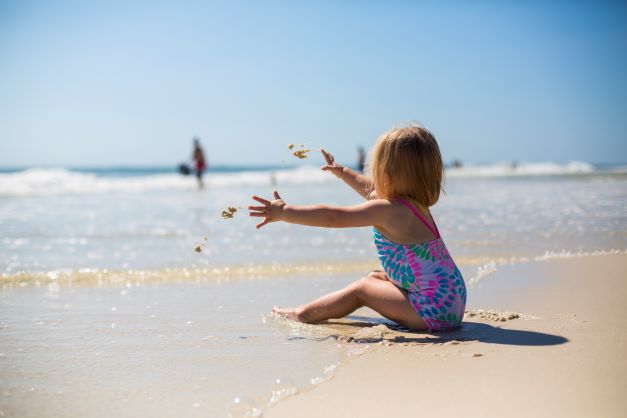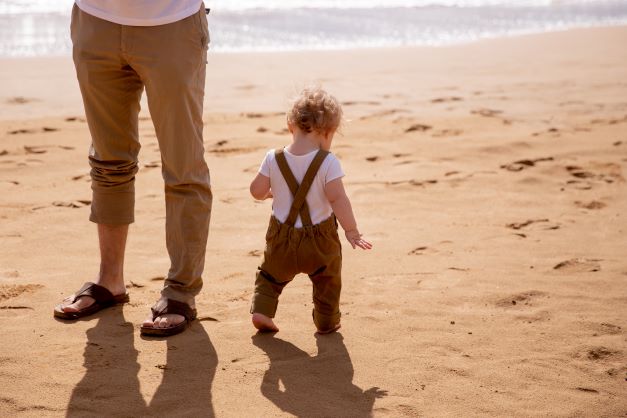Because your baby's skin is particularly sensitive to outside elements, keeping it properly secured should be your first objective in order to keep your child healthy. UV rays from the sun are hazardous to an adult's skin, especially during the summer months when it seems unbearable to spend time outside during the warmest portion of the day, not to mention the harm it may do to your young baby's skin, which requires special care. As a result, you must be well educated on how to safeguard your child throughout the hot summer months. Let's look at some safety precautions in the text below.
 |
| How To Perfectly Protect Your Baby From The Sun During Hot Weather [image: pexels] |
Why Are Babies at Risk?
Unfortunately, kids are the most vulnerable to solar damage, since severe heat may be detrimental to all children, especially infants. Because babies do not have a fully developed skin protective mechanism, they burn more quickly. Moreover, even children of darker complexions require comprehensive protection.
Babies' skin is more sensitive because the outside layer of their skin is thinner, leaving them more vulnerable to UV radiation. Furthermore, a newborn cannot tell you whether it is too hot. Your infant may start crying, and you won't know if they're sleepy, hungry, or overheated. However, you need to remember that you should definitely avoid going out with your little ones during the hottest period of the day. This way, you will protect not only them but yourself as well, because this can be quite harmful to adults as well.
Baby Carriers
Baby carriers are among the greatest baby equipment, making it easy to carry your baby about and enjoy your closeness. However, during the hot summer months, they may be rather inconvenient due to the heat, which can ruin all of your pleasure for both of you. Fortunately, you can now select the baby carrier for hot weather to keep you comfortable and sheltered from the sun. A compact and breathable wrap carrier is an option, as is a light and slender buckle carrier with ventilated mesh vents. Whatever you select, keep in mind that it will operate as an additional layer of clothing, so make sure that the baby is constantly cool, dry, and comfortable.
Proper Clothing
When taking your infant out during the summer, make sure they have dressed appropriately, such as in a light, long-sleeved shirt and slacks. In addition, make sure your infant is constantly wearing a wide-brimmed hat and UV-protected sunglasses. Their clothing will undoubtedly protect their fragile skin from the sun, allowing you to enjoy your time outside.
Sunscreen
When it comes to safeguarding your child from the sun, sunscreen may be a lifesaver. You should use one with a sun protection factor of at least 30, and make sure it also protects against UVA and UVB radiation. Because some of the chemicals might be irritating to newborns' skin, there are now choices created particularly for their delicate skin. As a result, be certain that the sunscreen will not harm your kid in any way.
Apply sunscreen 15-30 minutes before going outside and reapply frequently throughout the day. Waterproof sunscreens are wonderful for preventing sunscreen from getting into your child’s eyes, but sunscreens are not fully waterproof, so always reapply if you take your child into the water.
Proper Hydration
Babies, like adults, require adequate hydration at all times of the year. However, during the summer, this must be managed differently since dehydration can cause major health problems and even be fatal for a delicate and underdeveloped baby's immune system. Breastfed newborns do not require actual water since they obtain all they need from their mothers' milk. As a result, you may need to nurse them more frequently throughout the hot months. When bottle-feeding newborns, you can offer them a little bottle of water in addition to their customary meal. When you start giving them solid meals, you'll also need to give them extra water, allowing them to drink from a cup or beaker during the meal.
Stay in the Shade
Sun umbrellas, tents, and other forms of shade can help you prevent sun exposure, but keep in mind that sand, pavement, and water all reflect the sun's rays. As a result, it is far preferable to remain in the shade and therefore safeguard your child's safety. The sun's UV rays are at their highest between 10 in the morning and 5 in the afternoon, so avoid the sun as much as possible during this period.
We hope that this post has helped you understand all of the actions you need to take to keep your baby safe and healthy throughout the hot summer months. They do demand a lot more care and attention but keep in mind that you should also protect yourself because dangerous UV rays are hazardous to everyone, regardless of age.


No comments:
Post a Comment
Please Leave a Comment to show some Love ~ Thanks